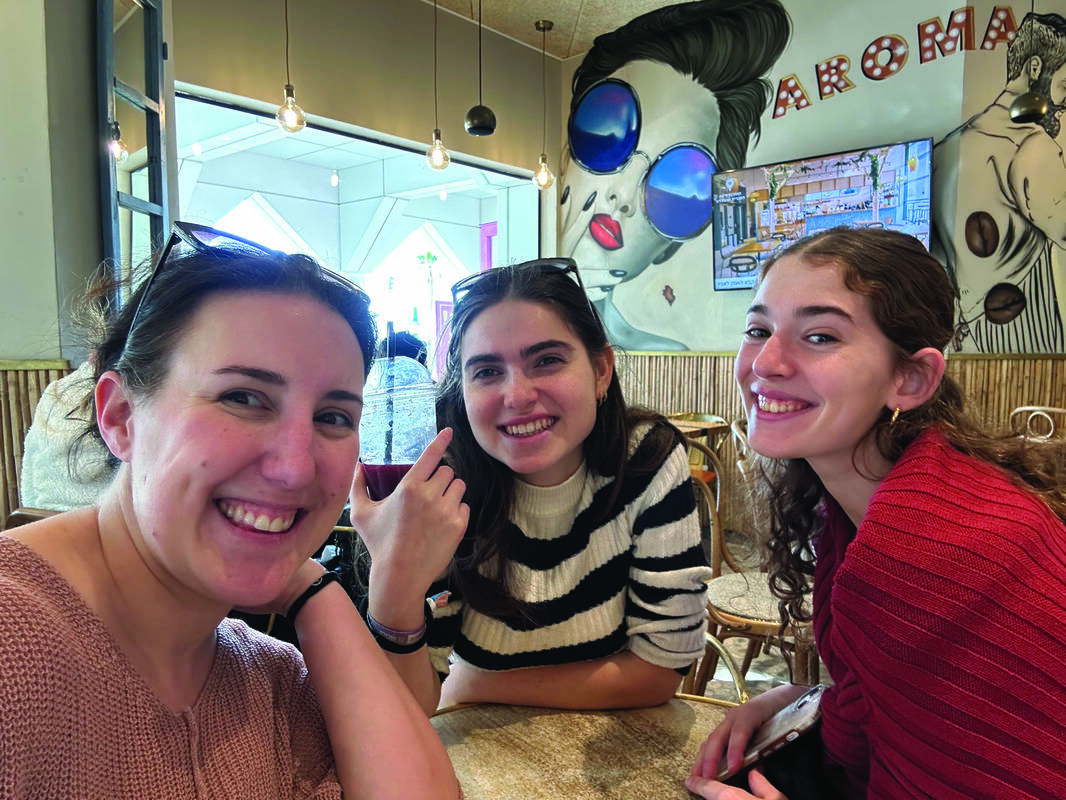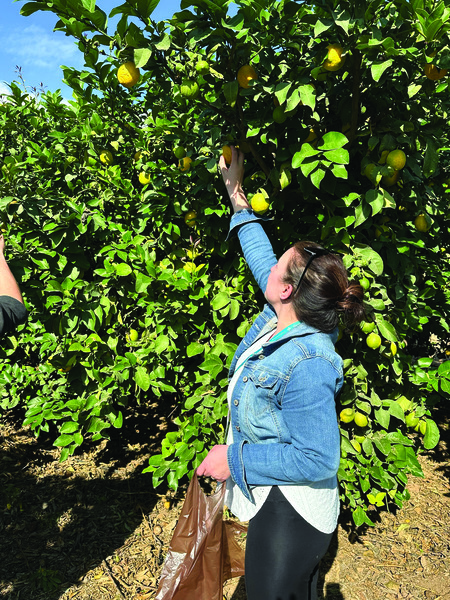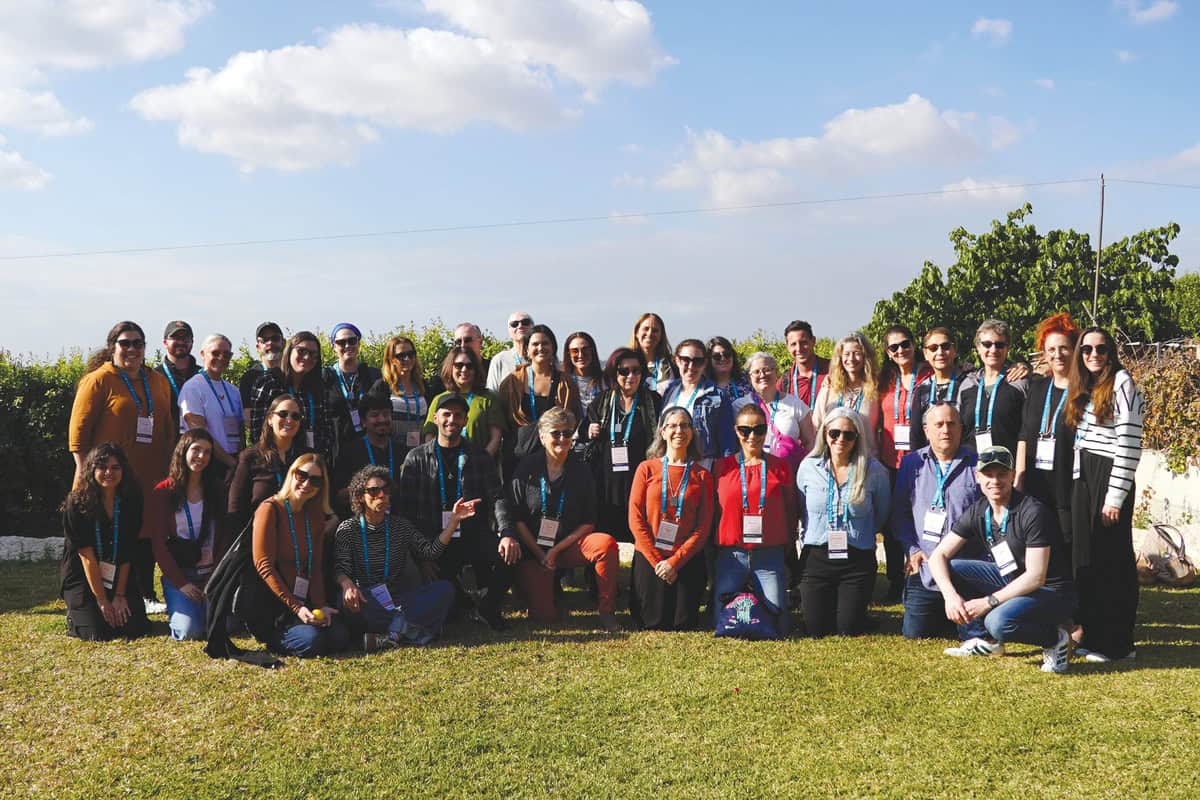The dichotomy I recently experienced during my first trip to Israel is a testament to the emotional complexities of the country. Organized by the iCenter in partnership with the JCCA, this journey brought 24 JCC professionals together for a Mifgash (Encounter) that Matters. Over three days, we were immersed in stories of resilience and tragedy, oscillating between overwhelming despair and uncontainable pride. By the end, I realized the profound truth in what an Israeli JCC professional told me: “Don’t fight it, feel it. What you’re feeling is Israel.”
Our first day began at the Nova site, which had little significance prior to October 7, but is now scarred by the events of that morning. On the bus, each of us was given a placard with the story of a Nova victim. Mine bore the name of Shahar Gindi, a 25-year-old justice advocate who loved to travel. She and her partner, Almog, embodied kindness, even amidst tragedy. At her memorial, I lit a candle, mourning not just a collective loss but an individual—a vibrant life cut short. It was an emotionally heavy start to the day, but only the beginning.
From the Nova site, we traveled to Moshav Tkuma where we met Dganit Bar Hai. On October 7, the community, armed only with the training of our biblical ancestors and determination, created an illusion of strength by banging pots and honking horns, deterring attackers. Dganit now helps people heal through agriculture. Survivors and soldiers work the land, their physical labor grounding them in a homeland that continues to bear their grief and hopes. Watching the smoke from Gaza just 5 kilometers away, I felt the tension between devastation and the human capacity to rebuild.
This tension followed us to Sderot, where educators shared their efforts to support displaced youth. They spoke about how teens who had been traumatized into silence were given responsibilities to help them find meaning and purpose, including delivering meals to older adults, reading to younger children, and performing other small but meaningful tasks. Witnessing their transformation during displacement reinforced the community’s resilience and determination to heal. Educators took lessons from their time as evacuees to change the education model in most schools in Sderot once they returned.
We then met Youssef Alziadna, a Bedouin minibus driver who saved 30 lives during the Nova Festival tragedy. His account of risking everything to rescue young Israeli Jews after a client called him saying, “Youssef, save us,” was both harrowing and inspiring. “I am a Bedouin,” he said, “I’m an Arab, I’m an Israeli, and I am proud to call Israel my home.”
We met Maayan, the granddaughter of released hostage Yocheved Lifshitz and a member of the Hostages and Missing Families Forum, on the second day. Her recounting of the days leading up to her grandparents’ capture and the excruciating wait for Yocheved’s release left us all vis-cerally feeling the cruelty of uncertainty. Later, we walked with Maayan through Hostage Square. The juxtaposition of bustling progress against the displays of unresolved trauma and mourning was impossible to ignore.
In Jerusalem, we met Adar Sharif, a farmer from Gesher Haziv who evacuated his wife and children but stayed on his land despite ongoing threats to protect his crops. His story of resilience and the reality of diving under his truck to avoid rocket fire was heart-wrenching and inspiring. He remained dedicated to preserving his land and livelihood and protecting his 20 foreign workers for 14 months as Hezbollah rained rockets down on his fields.
After our conversation with Sharif, we drove the short distance to Beit Avi Chai, where we met Israeli musician Shai Tsabari. We were treated to an experience that transcended a concert as Tsabari’s songs were interspersed with discussion about how he has spent the past 14 months traveling around Israel to sing at shivas of those who have died in the war.
“Give me your hand my brother
It’s sunset time
A delightful moment, no unnecessary words
In my dreams, your figure appears
A moment of peace
Spreads on my face”
-Translation from Shai Tsabari’s song, M’alei D’mamah (Silence Above Me)
The following day, we met with staff and fellows from the Inter-Agency Task Force to discuss the challenges and aspirations of young Israeli Arabs. During a breakout session, I spoke with Fadi, a man in his late 20s from Tel Aviv who lost eight family members who lived in Gaza. Fadi shared the fears he’s faced since October 7. He says he now avoids speaking Arabic in public, ignoring phone calls until he’s home. He spoke with candor about navigating his dual identity as an Arab and an Israeli and the guilt he has carried since the war’s start. When visiting a Jewish friend’s shiva for her husband, killed in combat, he worried she might reject his presence or blame him for the conflict. Even when she welcomed him, he couldn’t shake the displaced guilt for atrocities he never committed. Fadi’s story highlighted the unique emotional dichotomy faced by many Israeli Arabs today, mourning losses on both sides while feeling caught in between.
I stayed with my cousin David and his family in Tel Aviv for a few days before the program began. I watched the sunset over the Mediterranean with my family, ate Golda ice cream with David, met Maya and Naomi (Tidewater’s ShinShiniot from last year) to shop in the Shuk, and ate lunch on the beach. Teddy, my six-year-old cousin, corrected my accent, and three-year-old Emanuelle sang songs she learned in Gan. The contrast to the joy and happiness we experienced every day in Israel, to the sirens that woke us at 2:30 in the morning before a rocket hit Teddy’s friend’s school in Ramat Gan, was sobering.
After the program ended, I returned to David’s house for dinner before my flight home. As I helped put my little cousins to bed in their safe room, I struggled to process a whirlwind of emotions. The devastation of loss, my pride in Israel’s resilience, and the recognition of my privilege as a Jew in the diaspora during this war weighed heavily on me. Weeks later, the dissonance remains.
This trip has forever altered my connection to Israel. I don’t just know her; I feel her. The dichotomy of despair, hope, grief, and pride mirrors the country’s essence. I can’t wait to return.
Sierra Lautman, senior director of Jewish Innovation for United Jewish Federation of Tidewater, may be reached at SLautman@UJFT.org.



